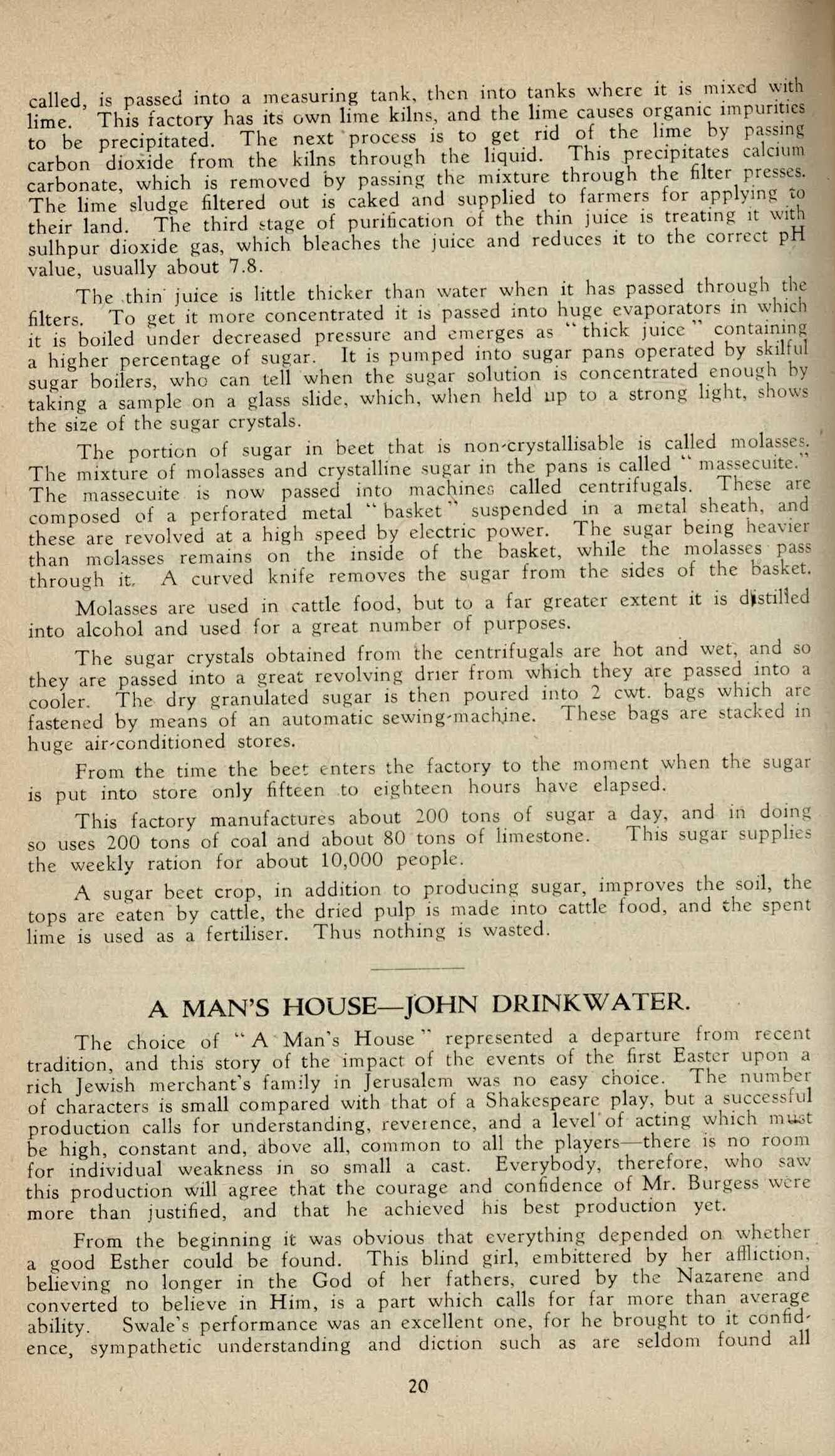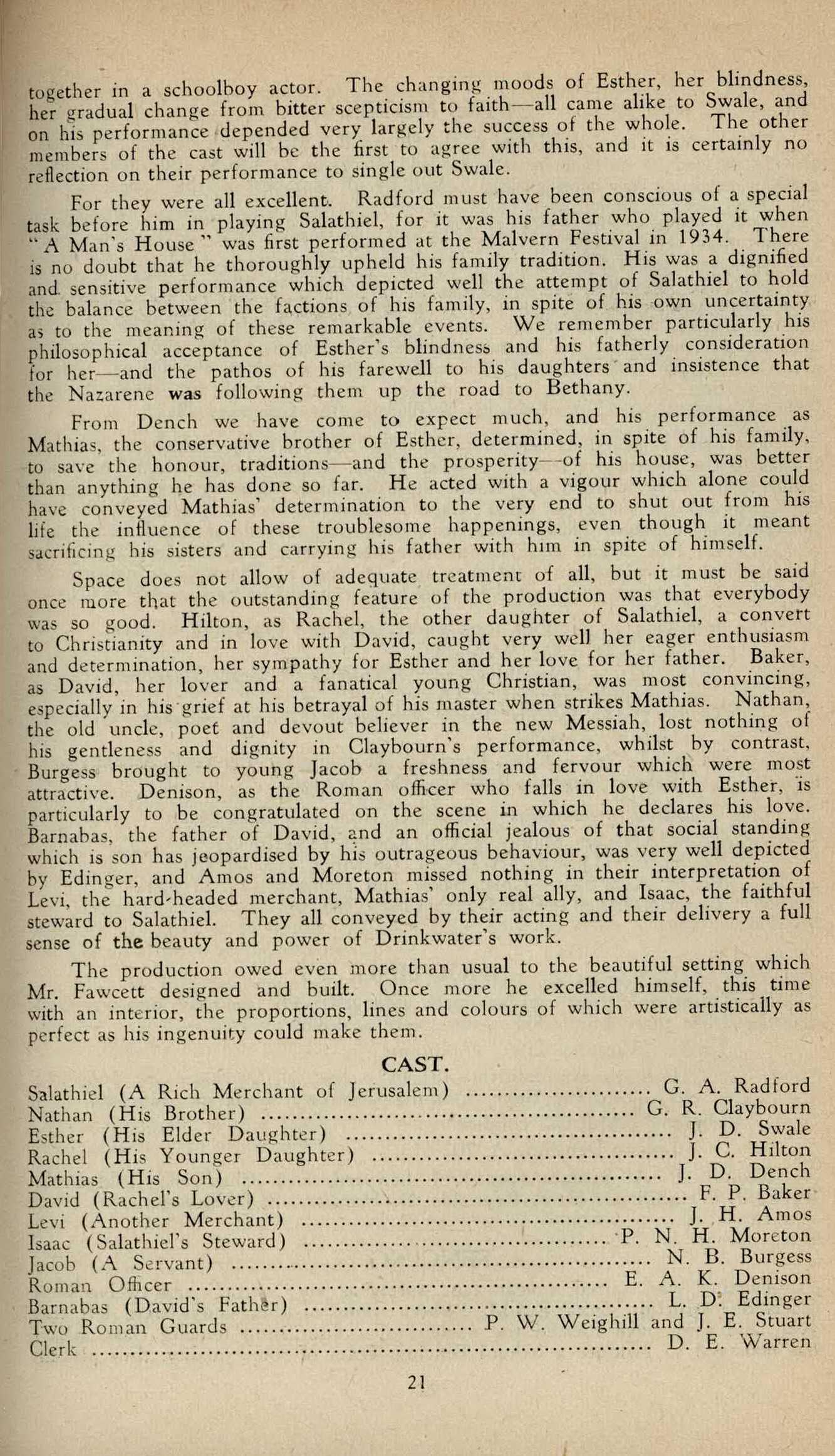
6 minute read
A Man's House—John Drinkwater
from Feb 1946
by StPetersYork
called, is passed into a measuring tank, then into tanks where it is mixed with . lime. This factory has its own lime kilns, and the lime causes organic impurities to be precipitated. The next 'process is to get rid of the lime by passing carbon dioiide from the kilns through the liquid. This precipitates calcium carbonate, which is removed by passing the mixture through the filter presses. The lime sludge filtered out is caked and supplied to farmers for applying to their land. The third stage of purification of the thin juice is treating it with sulhpur dioxide gas, which bleaches the juice and reduces it to the correct pH value, usually about 7.8. The .thin . juice is little thicker than water when it has passed through the filters. To get it more concentrated it is passed into huge evaporators in which it is boiled under decreased pressure and emerges as — thick juice " containing a higher percentage of sugar. It is pumped into sugar pans operated by skilful sugar boilers, who can tell when the sugar solution is concentrated enough by taking a sample on a glass slide, which, when held up to a strong light, shows the size of the sugar crystals.
The portion of sugar in beet that is non-crystallisable is called molasses. The mixture of molasses and crystalline sugar in the pans is called " massecuite." The massecuite is now passed into machines called centrifugals. These are composed of a perforated metal " basket " suspended in a metal sheath, and these are revolved at a high speed by electric power. The sugar being heavier than molasses remains on the inside of the basket, while the molasses pass through it, A curved knife removes the sugar from the sides of the basket.
Molasses are used in cattle food, but to a far greater extent it is distilled into alcohol and used for a great number of purposes.
The sugar crystals obtained from the centrifugals are hot and wet, and so they are passed into a great revolving drier from which they are passed into a cooler. The • dry granulated sugar is then poured into 2 cwt. bags which are fastened by means of an automatic sewing-machine. These bags are stacked in huge air-conditioned stores.
From the time the beet enters the factory to the moment when the sugar is put into store only fifteen to eighteen hours have elapsed.
This factory manufactures about 200 tons of sugar a day, and in doing so uses 200 tons of coal and about 80 tons of limestone. This sugar supplies the weekly ration for about 10,000 people.
A sugar beet crop, in addition to producing sugar, improves the soil, the tops are eaten by cattle, the dried pulp is made into cattle food, and the spent lime is used as a fertiliser. Thus nothing is wasted.
A MAN'S HOUSE—JOHN DRINKWATER. •
The choice of " A' Man's House' represented a departure from recent tradition, and this story of the impact of the events of the first Easter upon a rich Jewish merchant's family in Jerusalem was no easy choice. The number of characters is small compared with that of a Shakespeare play, but a successful production calls for understanding, reverence, and a level' of acting which must be high, constant and, above all, common to all the players—there is no room for individual weakness in so small a cast. Everybody, therefore, who saw this production will agree that the courage and confidence of Mr. Burgess were more than justified, and that he achieved his best production yet.
From the beginning it was obvious that everything depended on whether a good Esther could be found. This blind girl, embittered by her affliction, believing no longer in the God of her fathers, cured by the Nazarene and converted to believe in Him, is a part which calls for far more than average ability. Swale's performance was an excellent one, for he brought to it confidence, sympathetic understanding and diction such as are seldom found all 20
together in a schoolboy actor. The changing moods of Esther, her blindness, her gradual change from bitter scepticism to faith—all came alike to Swale, and on his performance depended very largely the success of the whole. The other members of the cast will be the first to agree with this, and it is certainly no reflection on their performance to single out Swale.
For they were all excellent. Radford must have been conscious of a special task before him in playing Salathiel, for it was his father who played it when " A Man's House " was first performed at the Malvern Festival in 1934. There is no doubt that he thoroughly upheld his family tradition. His was a dignified and. sensitive performance which depicted well the attempt of Salathiel to hold the balance between the factions of his family, in spite of his -own uncertainty as to the meaning of these remarkable events. We remember particularly his philosophical acceptance of Esther's blindness and his fatherly consideration for her—and the pathos of his farewell to his daughters' and insistence that the Nazarene was following them up the road to Bethany.
From Dench we have come to expect much, and his performance as Mathias, the conservative brother of Esther, determined, in spite of his family, to save the honour, traditions—and the prosperity--of his house, was better than anything he has done so far. He acted with a vigour which alone could have conveyed Mathias' determination to the very end to shut out from his life the influence of these troublesome happenings, even though it meant sacrificing his sisters and carrying his father with him in spite of himself.
Space does not allow of adequate, treatment of all, but it must be said once more that the outstanding feature of the production was that everybody was so good. Hilton, as Rachel, the other daughter of Salathiel, a convert to Christianity and in love with David, caught very well her eager enthusiasm and determination, her sympathy for Esther and her love for her father. Baker, as David, her lover and a fanatical young Christian, was most convincing, especially in his - grief at his betrayal of his master when strikes Mathias. Nathan, the old uncle, poet and devout believer in the new Messiah, lost nothing of his gentleness and dignity in Claybourn's performance, whilst by contrast, Burgess brought to young Jacob a freshness and fervour which were most attractive. Denison, as the Roman officer who falls in love with Esther, is particularly to be congratulated on the scene in which he declares his love. Barnabas, the father of David, and an official jealous of that social standing which is son has jeopardised by his outrageous behaviour, was very well depicted by Edinger, and Amos and Moreton missed nothing in their interpretation of Levi, the hard-headed merchant, Mathias' only real ally, and Isaac, the faithful steward to Salathiel. They all conveyed by their acting and their delivery a full sense of the beauty and power of Drinkwater's work.
The production owed even more than usual to the beautiful setting which Mr. Fawcett designed and built. Once more he excelled himself, this time with an interior, the proportions, lines and colours of which were artistically as perfect as his ingenuity could make them.
CAST.
Salathiel (A Rich Merchant of Jerusalem) Nathan (His Brother) Esther (His Elder Daughter) Rachel (His Younger Daughter) Mathias (His Son) David (Rachel's Lover) Levi (Another Merchant) Isaac (Salathiel's Steward) Jacob (A Servant) Roman Officer Barnabas (David's Fathr) Two Roman Guards Clerk G. A. Radford G. R. Claybourn J. D. Swale J. C. Hilton J. D. Dench F. P. Baker- J. H. Amos •P. N. H. Moreton N. B. Burgess E. A. K. Denison L. Dl Edinger P. W. Weighill and J. E. Stuart D. E. Warren 21





